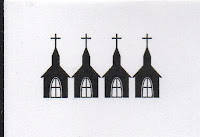Since we don't review the movies here at Movie Churches (instead, we review clergy and churches in movies -- as you know), many, many of the films here aren't good. Some are almost painful to watch, but I do it for the good of you, dear readers. These, on the other hand, are films I enjoyed. Some of them I love dearly. They're divided into categories, and if you'd like to know more, click the title to go to the original post. Most are available on Amazon Prime.
Robert Duvall Trilogy
Duvall has made (IMHO) made three of the best films about the Christian faith. (And a couple of pretty awful ones as well, but that’s not what we’re talking about here.)
Get Low
Tender Mercies
The Apostle (language and violence)
Robert Duvall Trilogy
Duvall has made (IMHO) made three of the best films about the Christian faith. (And a couple of pretty awful ones as well, but that’s not what we’re talking about here.)
Get Low
Tender Mercies
The Apostle (language and violence)
Classics
Two of these films won the Oscar for Best Picture, and the other should have. (And all of the clergy did pretty well in their steeple ratings too.)
On the Waterfront (Adult themes)
A Man for All Seasons
The Quiet Man
Comedy
Frankly, there have been funnier films reviewed here, but the original request stressed that the films should be family-friendly. Still, these films did make me laugh.
Heaven’s Above
Millions (language)
O Brother Where Art Thou (language and sensuality)
Foreign
I know, I know, reading is hard. Subtitles. But worth it.
Au Revoir, Les Enfants
Joyeux Noel (violence)
We Are Brothers (strong language)
Musicals
The theology is rarely great in musicals, and these films aren’t exceptions. But they’re fun.
Cabin in the Sky
Guys and Dolls
The Sound of Music
Science Fiction/Horror
For some reason, people often think these genres are not Christian. But horror acknowledges the supernatural and science fiction often stresses that some things are beyond human understanding.
The Hunchback of Norte Dame
Signs (language, violence)
War of the Worlds (1953)
Worthy Christian Films
Christian films are, as a group, pretty bad. Too often they're nothing more than sappy propaganda. I’ve watched some really bad Christian films for this blog, but I enjoyed these.
The Case for Christ
Soul Surfer
Grace Unplugged
What about you? Looking for any movie recommendations? Let me know.
Two of these films won the Oscar for Best Picture, and the other should have. (And all of the clergy did pretty well in their steeple ratings too.)
On the Waterfront (Adult themes)
A Man for All Seasons
The Quiet Man
Comedy
Frankly, there have been funnier films reviewed here, but the original request stressed that the films should be family-friendly. Still, these films did make me laugh.
Heaven’s Above
Millions (language)
O Brother Where Art Thou (language and sensuality)
Foreign
I know, I know, reading is hard. Subtitles. But worth it.
Au Revoir, Les Enfants
Joyeux Noel (violence)
We Are Brothers (strong language)
Musicals
The theology is rarely great in musicals, and these films aren’t exceptions. But they’re fun.
Cabin in the Sky
Guys and Dolls
The Sound of Music
Science Fiction/Horror
For some reason, people often think these genres are not Christian. But horror acknowledges the supernatural and science fiction often stresses that some things are beyond human understanding.
The Hunchback of Norte Dame
Signs (language, violence)
War of the Worlds (1953)
Worthy Christian Films
Christian films are, as a group, pretty bad. Too often they're nothing more than sappy propaganda. I’ve watched some really bad Christian films for this blog, but I enjoyed these.
The Case for Christ
Soul Surfer
Grace Unplugged
What about you? Looking for any movie recommendations? Let me know.




















